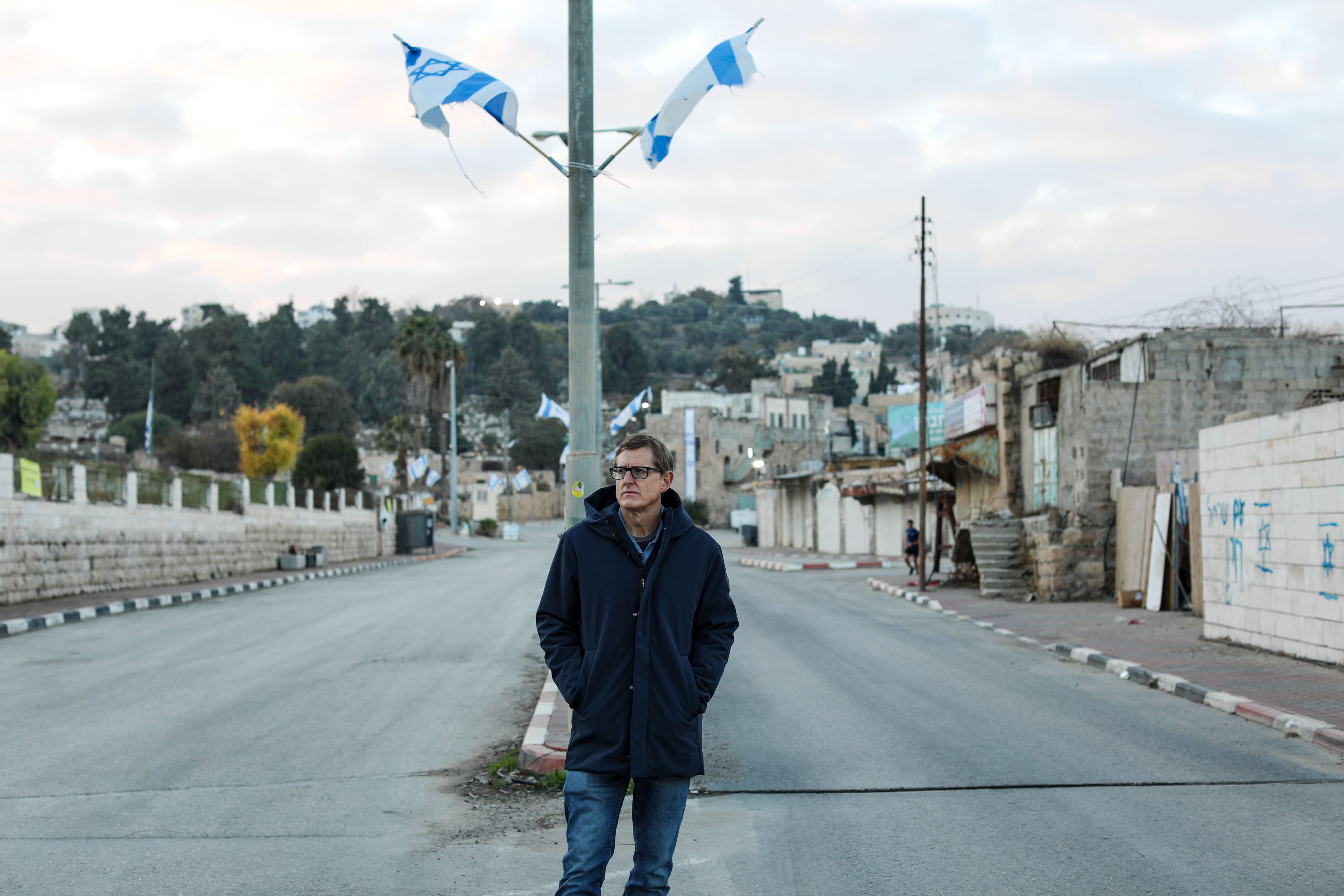
The evolution of Louis Theroux as a documentary maker has been fascinating to observe. Back in the 1990s, he specialised in knowing winks to camera, deploying a mixture of charm and carefully calibrated haplessness to gain the confidence of his subjects. Usually, these weren’t particularly serious people – but even if they were, he tended to undermine them by accentuating their absurdity. White supremacists, for example, or Christian nationalists, weren’t seen as much more than fodder for mockery back then.
So much for those innocent, flippant times: Theroux is older and wiser and, in any case, has been hunting for bigger game for some years now. He first visited Israeli settlers in the Palestinian West Bank back in 2011. Even then, it wasn’t a situation that invited levity in any way.
His return in BBC Two’s Louis Theroux: The Settlers uncovers an even bleaker modern reality. A decade and a half ago, the people he met felt like outliers. His original documentary was called Ultra Zionists, a title that told its own story. Now, this once-fringe group are represented at the very heart of the Israeli government: Israel’s current minister of national security, Itamar Ben-Gvir, is seen on a stage during this film, whipping up the crowd. In the aftermath of the Hamas attack on Israel on 7 October 2023, this is their time.
“Welcome to Judea,” says settler Ari Abramowitz when Theroux arrives at his home. Abramowitz’s abode is illegal under international law – he’s armed to the teeth, and these settlements (essentially, residential incursions into Palestinian territory) are guarded by the Israeli army in defiance of the law. What emerges is an ideology of closed loops. Where is the nearest Palestinian town, asks Theroux. “I’m so uncomfortable using that word,” Abramowitz replies, objecting to the descriptor “Palestinian”. “I don’t think they exist as a real nation, with a real claim to this land.”
He sees himself as “the tip of the spear… defending the entire Western world”. The land, he believes, belongs to Israel. His proof is the Bible – a document that, as Theroux points out, is essentially regarded as a land deed by the settlers. Abramowitz, incidentally, hails originally from Texas.
This rigidity eventually causes a narrative problem for the documentary. Everywhere Theroux goes, he bumps up against the same brick wall. “The land is ours. Palestine doesn’t exist. It’s not a matter for debate.” Accordingly, the film isn’t really packed with an escalating series of revelations, just an escalating sense of futility, as the same arguments are repeated almost ritualistically. The rigidity is the point.
Still, even unconsciously, plenty of issues are clarified. Daniella Weiss, the 79-year-old known as the “godmother” of the settler movement, is clear about where she stands in relation to the Israeli government. “Netanyahu … is very happy about what we do here. But he cannot say it.” Essentially, she’s confirming the existence of a state agenda that runs contrary to the Geneva Conventions.

But sadly, the world doesn’t currently seem interested in intervening. Theroux’s implicit message here is essentially moderate and compromising. He posits a two-state solution and asks the settlers he meets whether it concerns them that the level of threat they evidently feel might be shared by the people they regard as mortal enemies. Again, he hits a revealing blankness – the lack of concern for Palestinian civilians is as absolute as the scorn for international law.
Often, this manifests as a sort of deadly, weaponised pettiness. A group of Palestinians harvesting olives are menaced by a group of heavily armed IDF (Israeli Defense Forces) soldiers. Theroux meets Issa, a Palestinian man who gives him a guided tour of Hebron. Everything is closed. It’s an impossible maze of checkpoints. IDF soldiers are everywhere, checking papers, obstructing movement, proscribing free will. There’s clearly a tactic of making life impossible in a practical sense, in the hope that Palestinians will leave out of sheer despair. And many have.
Towards the end of the film, Theroux stops at a West Bank checkpoint and a soldier asks him how long he intends to stay in Israel. It feels like a Freudian slip: does this representative of Israeli state power already consider the acquisition, occupation and incorporation of this land a done deal? And the realisation occurs that eliciting these tiny moments of accidental honesty is still Theroux’s biggest strength as an interviewer. People don’t feel threatened by him. They’re inclined to open up.
At the beginning of his career, he often deployed this skill in the service of frivolity. He’s now added seriousness – and even, at times, a degree of physical bravery. He’s been criticised in some quarters for platforming this particular strain of extremism, but no one is getting off the hook here – and in fact, challenging people who seem beyond the pale is hardly unfamiliar territory for Theroux.
Arguably, given that the situation he’s examining feels like an endlessly repeating horror show, it becomes all the more important that documentary makers find a way in. For all the familiarity of his techniques – and even if his subjects seem tragically stuck – Louis Theroux continues to evolve.



